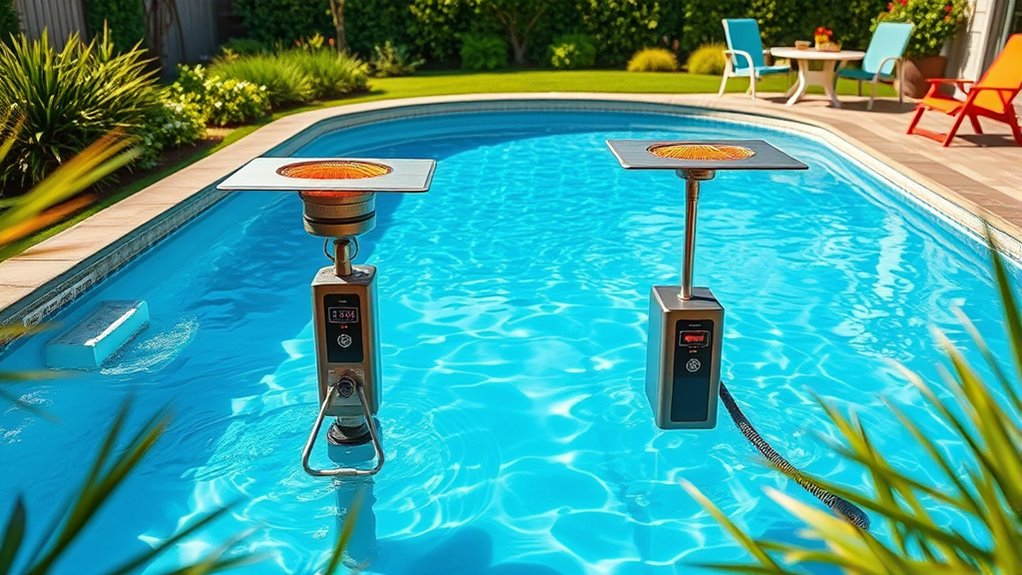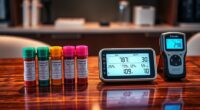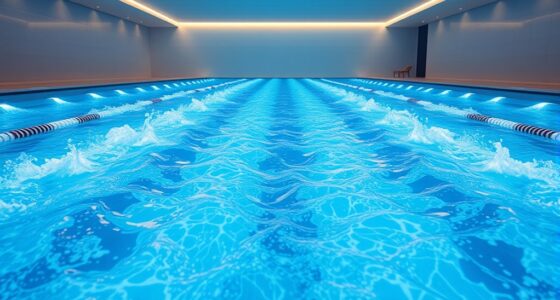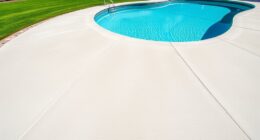If you’re looking for portable pool heaters for above-ground setups, you’ll find options like electric, propane, or solar heaters that suit different needs and budgets. Electric heaters are compact and quick, while propane models heat faster and are more portable for larger pools. Solar heaters are eco-friendly but rely on sunlight. To guarantee safe, efficient use, consider features like automatic shut-offs, insulation, and proper placement. Keep exploring for detailed tips to choose and maintain the best heater for your pool.
Key Takeaways
- Choose electric or propane portable heaters with suitable heating capacity for above-ground pools.
- Ensure the heater is lightweight, portable, and easy to set up near your above-ground pool area.
- Opt for models with safety features like automatic shut-off and adjustable temperature controls.
- Position the heater on a flat, stable surface away from wind drafts to maximize heating efficiency.
- Use insulation wraps and covers to retain heat, reduce energy costs, and extend the heater’s lifespan.
Types of Portable Pool Heaters

When choosing a portable pool heater, you’ll find several types designed to suit different needs and budgets. Electric heaters are popular for their ease of use and quick heating, making them ideal for small to medium pools. Propane heaters provide faster heating and higher temperatures, perfect if you want rapid warmth or have larger pools. Solar heaters rely on sunlight, making them an eco-friendly option with low operating costs, though they depend on weather conditions. Inverter heaters offer energy efficiency by adjusting power based on the pool’s temperature, helping you save on electricity. Each type has its advantages, so consider your pool size, budget, and heating preferences to choose the best fit for your setup. For optimal safety and performance, selecting a heater with proper safety features is essential. Additionally, understanding the energy efficiency of each heater type can help you reduce long-term operating costs and environmental impact. Paying attention to installation requirements can ensure your heater operates safely and effectively over time. Regular maintenance practices are also key to prolonging the lifespan and efficiency of your pool heater, and staying informed about emerging market innovations can help you choose more sustainable and cost-effective options.
Key Features to Consider When Choosing a Portable Pool Heater
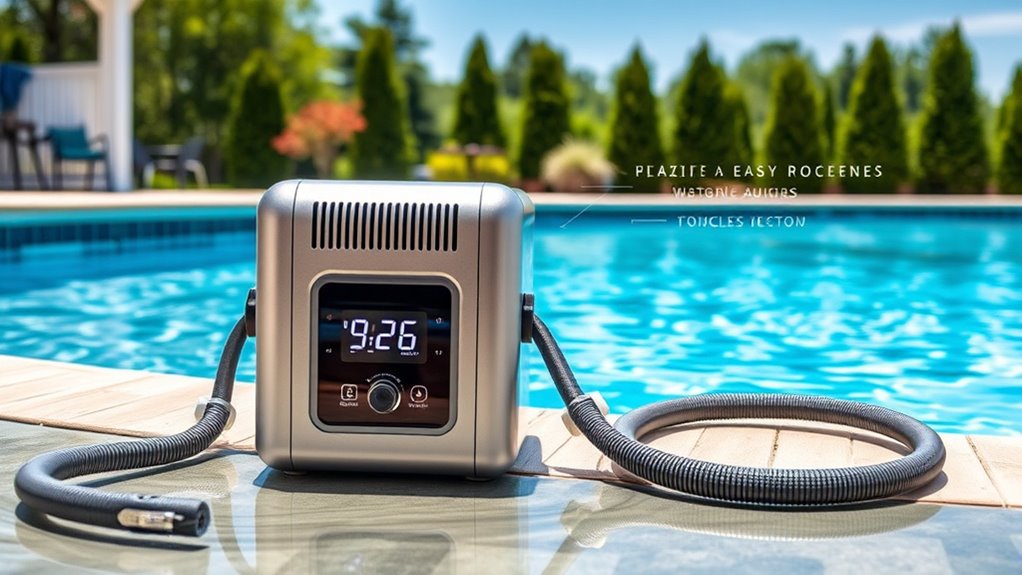
Choosing the right portable pool heater involves evaluating several key features to guarantee it meets your needs. First, consider the heating capacity, which determines how quickly it warms your pool. Next, look at energy efficiency to save on running costs. Portability features like weight and handles make setup easier. Durability matters, especially if you’ll use it frequently or in harsh weather. Safety features such as automatic shut-off or temperature controls protect you and your pool. Additionally, understanding energy consumption can help you select a model that balances performance with ongoing operational costs. Incorporating thermal insulation can further enhance efficiency by reducing heat loss and maintaining the desired temperature more effectively. Being aware of industry trends can also help you choose the most innovative and reliable models available. Staying informed about technological advancements can lead to better performance and increased safety features in modern portable heaters.
Top Portable Pool Heaters on the Market
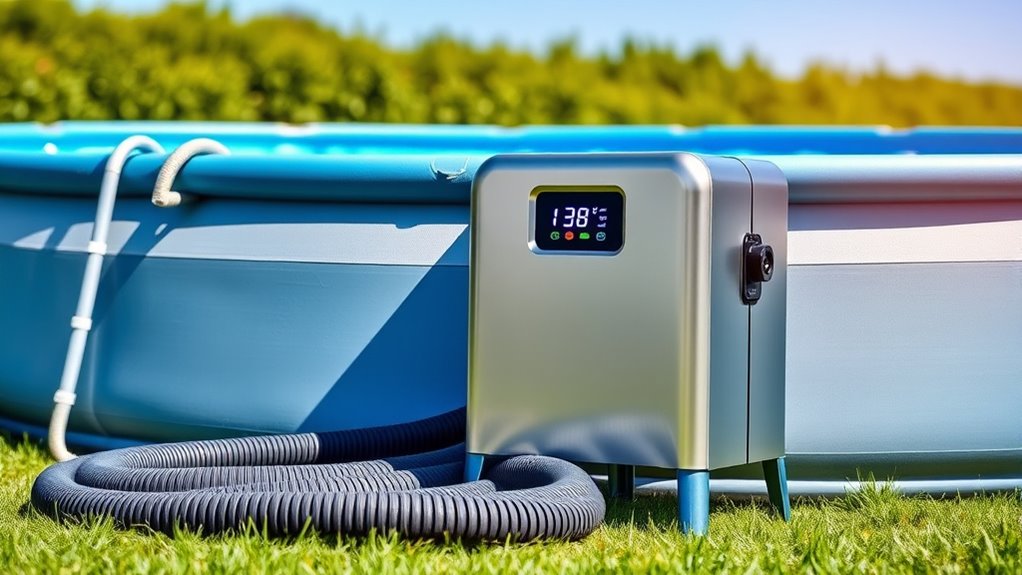
When choosing the best portable pool heaters, you’ll want options that heat efficiently and are easy to move around. The market offers a variety of models that balance power with portability, so you can enjoy warm water without hassle. Let’s look at some top picks that meet these key points.
Efficient Heating Options
If you want to keep your pool warm without inflating your energy bills, investing in an efficient portable heater is a smart move. These heaters use less energy while delivering effective warmth, saving you money. For example, electric models are compact and quick to heat, perfect for above-ground pools. Propane heaters offer faster heating and longer run times, ideal for larger setups. Gas heaters can be more energy-efficient over time, especially with regular use. Here’s a quick comparison:
| Heater Type | Key Benefit |
|---|---|
| Electric | Quick, easy, low upfront cost |
| Propane | Fast heating, portable |
| Gas | Energy-efficient, long-lasting |
Choosing the right option depends on your pool size and usage frequency, ensuring efficient, cost-effective heating.
Portability and Ease
Portable pool heaters stand out for their lightweight design and simple setup, making it easy to enjoy warm water without hassle. You can quickly move them around your yard or store them when not in use. Many models come with handles or wheels, so you won’t strain your back carrying or repositioning them. They typically require minimal installation—just plug in and turn on—so you can start heating your pool almost immediately. This convenience means you don’t need professional help or complicated setups. Whether you’re preparing for a spontaneous swim or maintaining a consistent temperature, these heaters make it straightforward. Their compact size allows for easy storage during the off-season, ensuring your investment stays accessible and functional whenever you need it. Additionally, efficient performance is often achieved with models designed for quick heating and reliable operation.
Installation and Setup Tips for Portable Pool Heaters

Proper installation and setup are essential to guarantee your portable pool heater works efficiently and safely. First, choose a flat, stable surface close to your pool’s power source and water inlet. Confirm the area is well-ventilated and free from obstructions. Connect the heater to a dedicated power outlet with the correct voltage and amperage; avoid using extension cords. Attach the hoses securely, making sure they are tight to prevent leaks. Fill the pool with water above the heater’s intake level before turning it on. Double-check all connections and settings. Refer to the manufacturer’s instructions for specific steps, and always follow local electrical codes. Proper setup not only optimizes performance but also prolongs your heater’s lifespan.
Maintenance and Safety Guidelines
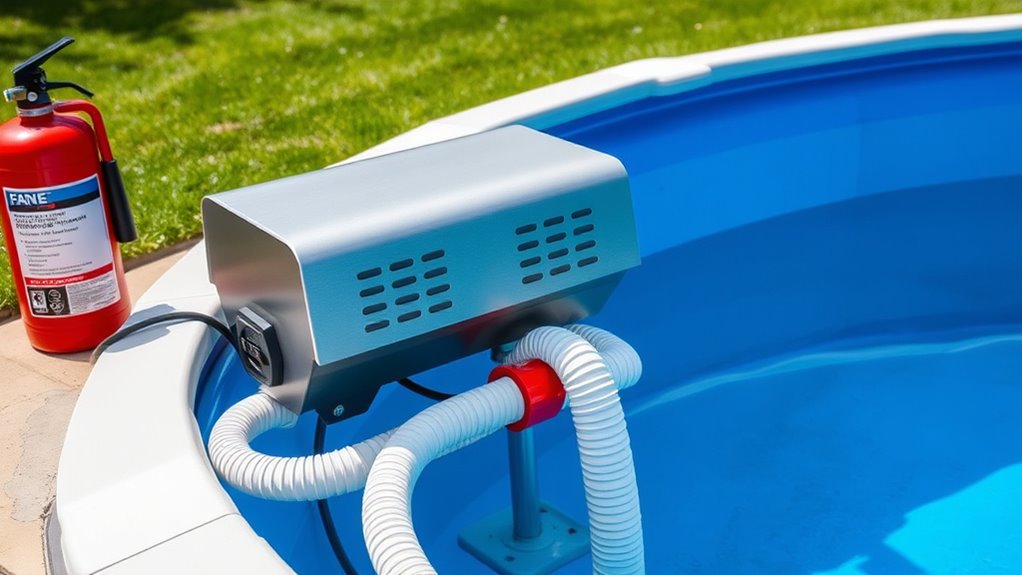
Regular maintenance and adherence to safety guidelines are essential to keep your pool heater operating efficiently and prevent accidents. You should regularly inspect connections for leaks, clean filters, and ensure the unit is dry after use to avoid corrosion. Proper installation procedures can greatly impact the safety and performance of your heater. Always follow manufacturer instructions for proper operation and maintenance. Additionally, monitoring the heater’s operational time can help prevent overheating and extend its lifespan maintenance practices. To keep safety in check, remember to:
- Keep the heater away from flammable materials and direct sunlight
- Turn off and unplug the heater before performing any maintenance
- Store the unit in a dry, secure location when not in use
- Be aware of electrical safety to prevent hazards associated with improper handling or faults
- Regularly check for filter efficiency to ensure optimal performance and air quality
- Understand the importance of self watering plant pots to maintain healthy plants and prevent overwatering.
Cost Comparison and Budget-Friendly Options
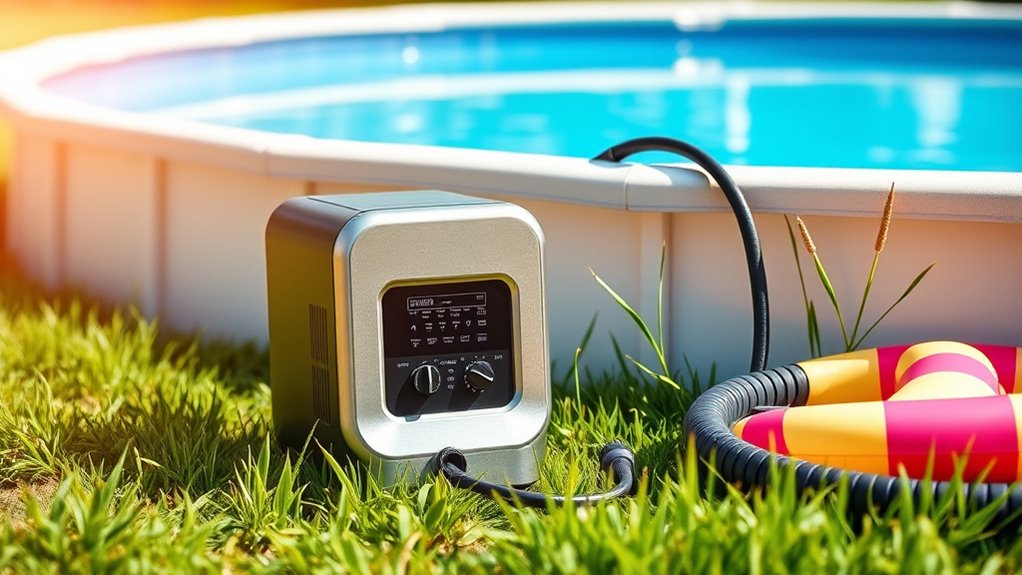
When comparing costs for pool heaters, you’ll find that upfront prices and long-term expenses vary considerably across different models. Budget-friendly options often have lower initial costs but may consume more energy, increasing your overall expenses. Conversely, investing a bit more upfront in energy-efficient models can save you money over time. To help you evaluate, consider this table:
| Budget Option | Cost and Efficiency |
|---|---|
| Basic Portable Heater | Low upfront, higher running costs |
| Mid-Range Energy-Efficient | Moderate upfront, lower running costs |
| Premium Models | Higher upfront, maximum savings over time |
| DIY or Alternative Heating | Minimal cost, variable results |
Choosing the right balance depends on your budget and long-term goals. Additionally, selecting a model with advanced control systems can further optimize energy use and savings over the lifespan of your heater. Incorporating energy efficiency considerations is essential for reducing operational costs. It’s also important to consider local climate factors, as they can influence the effectiveness and efficiency of different heating options. Proper installation and insulation can significantly enhance overall energy savings and prolong the lifespan of your heater.
Tips for Maximizing Heating Efficiency
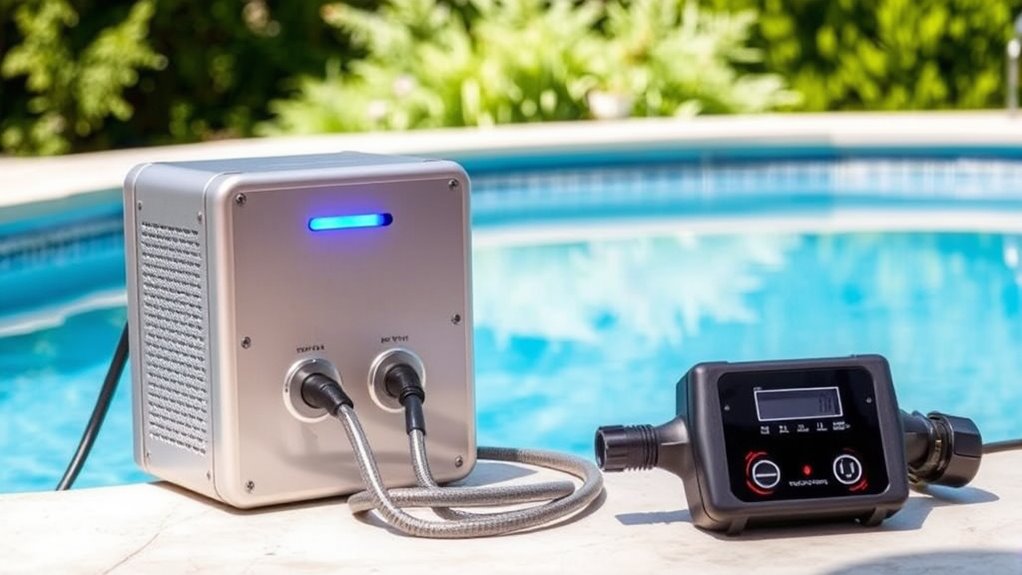
To get the most out of your portable pool heater, focus on improving insulation around your pool and equipment. Always use a pool cover to retain heat overnight and during colder days. Additionally, position your heater in a spot with good airflow and minimal obstruction to boost efficiency. Regularly check for signs of equipment malfunction to ensure optimal performance and safety. Incorporating proper market research can help you select the most energy-efficient models and accessories. Enhancing your lifestyle by maintaining an efficient heating system can also contribute to overall enjoyment and relaxation. Staying informed about technological advancements in automation can further optimize your pool setup’s efficiency and reduce energy costs.
Insulation Enhancements Tips
Enhancing your pool heater’s insulation can markedly boost its efficiency by trapping heat and reducing energy loss. To maximize this, focus on improving your setup’s insulation. You might consider:
- Wrapping the heater with specialized foam or reflective insulation to reflect heat back into the water
- Installing a bubble wrap or thermal blanket around the heater to minimize heat escape
- Elevating the heater off cold ground surfaces with insulated pads to prevent heat loss downward
These simple steps help retain more heat within your pool, reducing the workload on your heater. Proper insulation minimizes energy waste, keeps your water warmer longer, and lowers your utility bills. With these enhancements, your portable heater becomes a more effective and economical solution for enjoying your pool all season.
Proper Cover Usage
Using a proper cover is one of the simplest ways to maximize your portable pool heater’s efficiency. A good cover traps heat, reducing heat loss overnight and during cool weather. Make sure the cover fits snugly over your pool to prevent gaps that let heat escape. When not in use, keep the cover on to maintain water temperature and minimize energy waste. Clean the cover regularly to prevent dirt and debris from lowering its insulating properties. During colder months, consider using an insulated cover for added protection. Proper cover usage can cut energy costs, extend the life of your heater, and keep your pool warmer longer. Always choose a cover designed for your pool size and type for the best results.
Optimal Heater Placement
Proper cover usage helps retain heat, but placing your portable pool heater in the right spot can make an even bigger difference in its efficiency. Position your heater near the center of the pool to guarantee even heating and minimize heat loss. Keep it away from wind drafts that can cool the water and reduce effectiveness. Placing the heater on a flat, stable surface prevents shifting or tipping during operation. Consider shielding it with a windbreak or placing it behind a barrier to protect it from gusts. Visualize a heater:
- Sitting on a level, non-slip surface
- Shielded from strong winds by a barrier
- Positioned close enough for ideal water circulation
These steps help maximize heat transfer and keep your pool warmer longer.
Frequently Asked Questions
How Long Does It Typically Take to Heat a Pool With a Portable Heater?
Heating a pool depends on your heater’s size and your desired temperature. Usually, it takes about 8 to 12 hours for a portable heater to warm a standard-sized pool by a few degrees. If you’re aiming for a quick increase, it might take longer. To speed things up, cover the pool to retain heat. Keep in mind, consistent use and proper insulation make heating more efficient.
Are Portable Pool Heaters Energy-Efficient for Long-Term Use?
Imagine you’re in a 1950s movie, adjusting your portable heater by the poolside. Portable pool heaters can be energy-efficient for long-term use if you choose models with good insulation and adjustable settings, allowing you to manage energy consumption. However, they often use more power than fixed systems, especially if run frequently. To save energy, keep the heater covered when not in use and set it to maintain a consistent temperature.
Can Portable Heaters Be Used in Cold Weather Conditions?
You can use portable heaters in cold weather, but their effectiveness depends on the heater type and outdoor conditions. In colder temperatures, you’ll need a high-quality, weather-resistant model designed for low temperatures to maintain your pool’s warmth. Keep in mind, portable heaters may struggle in extreme cold, so supplementing with a cover or windbreak can help improve efficiency. Always check the manufacturer’s guidelines for ideal performance during winter months.
What Safety Features Should I Look for in a Portable Pool Heater?
When choosing a portable pool heater, you should look for safety features that keep you protected. Check for automatic shut-off to prevent overheating, a sturdy thermocouple to monitor temperature, and a leak detection system to avoid water damage. Guarantee it has a secure power cord and proper grounding to prevent electrical hazards. Prioritize models with clear, easy-to-understand safety instructions, so you can enjoy your pool responsibly and safely.
How Portable Are These Heaters—Can They Be Moved Easily Between Pools?
You want to know how portable these heaters are. Generally, portable pool heaters are designed for easy movement, often featuring lightweight materials and handles for convenience. You can usually move them between pools without much effort, especially if they’re compact. However, some models might be heavier or bulkier, making them trickier to transport. Always check the weight and size specifications to make certain they suit your needs for easy portability.
Conclusion
With the right portable pool heater, you can confidently create a cozy, cost-effective, and convenient aquatic oasis. By balancing budget, brilliance, and best practices, you’ll boost your bath time bliss. Remember, diligent maintenance and smart setup make your swimming season smoother and safer. So, seize the sunlight, select your heater wisely, and soak up the summer’s serenity—making every splash superb and satisfying.

